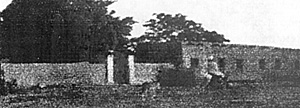Background
 There has been a European presence in sub-Saharan Africa since the first days of the sailing explorers in the 15th century. Often called forts or factories, these European settlements were used exclusively as trading centers. They traded hands between the European powers more times than you can count through the 16th, 17th and 18th centuriesBut always they remained trading stations. But by the 19th century, things started to change. The Industrial Age brought about changes in the European socio-economic system that made possible the actual exploration of
Africa. Scientific advances, improvements in weapons, medicine and transportation all made exploration and, eventually, colonization of Africa possible. But that's not the whole story. The Industrial Age, for whatever psychological reason, imbued a sense of wanderlust into the European, and especially Victorian, mind. It was this combination of desire and technological advances that started the Race for Africa.
There has been a European presence in sub-Saharan Africa since the first days of the sailing explorers in the 15th century. Often called forts or factories, these European settlements were used exclusively as trading centers. They traded hands between the European powers more times than you can count through the 16th, 17th and 18th centuriesBut always they remained trading stations. But by the 19th century, things started to change. The Industrial Age brought about changes in the European socio-economic system that made possible the actual exploration of
Africa. Scientific advances, improvements in weapons, medicine and transportation all made exploration and, eventually, colonization of Africa possible. But that's not the whole story. The Industrial Age, for whatever psychological reason, imbued a sense of wanderlust into the European, and especially Victorian, mind. It was this combination of desire and technological advances that started the Race for Africa.
European forays into Africa followed one of several paths. The earliest exploration was in West Africa. Explorers like Mungo Park and James Bruce explored the Niger and went in search of fabled Timbuktu. Those that reached it were usually disappointed. These early explorers faced incredible hardships and privations. Later came Burton and Speke and the search for the source of the Nile. Then David Livingstone explored north from the Cape and made his famous cross-continent journey. Stanley then went in search of the good Doctor, who really didn't need finding, and then rescued Emin Pasha, who didn't want to be rescued. Each expedition had several phases. The first, and actually the most important, was getting sponsorship (i.e., money) from some society or philanthropist, or even government.
The earliest expeditions, in the late 18th century, were mostly sponsored by the British African Society, a private organization dedicated to the exploration of Africa. The second phase occurs upon arrival in Africa, at whichever departure point you have chosen. Once there, you must find and recruit guides, bearers and askari [Askari is both the singular and plural form of the word. It means "soldier" in swahili].This is also quite important because if you don't have reliable men, you are going to be in a lot of trouble. However, if you have enough money, it is easier to attract the best personnel. The third phase is actually exploring the unknown. This is where the fun happens, although in reality there wasn't a whole lot of fun involved (unless you're Richard Burton, who seemed to have had 'fun' wherever he went, much to John Speke's annoyance).
More Campaigning
-
Campaigning in Darkest Africa: Introduction
Campaigning Phase 1: The Mission
Campaigning Phase 2: The Party
Campaigning Phase 3: The Adventure
Campaigning Sample Campaign
Campaigning Cards (very slow: 290K)
Back to The Heliograph #115 Table of Contents
Back to The Heliograph List of Issues
Back to Master Magazine List
© Copyright 1999 by Richard Brooks.
This article appears in MagWeb (Magazine Web) on the Internet World Wide Web.
Other military history articles and gaming articles are available at http://www.magweb.com